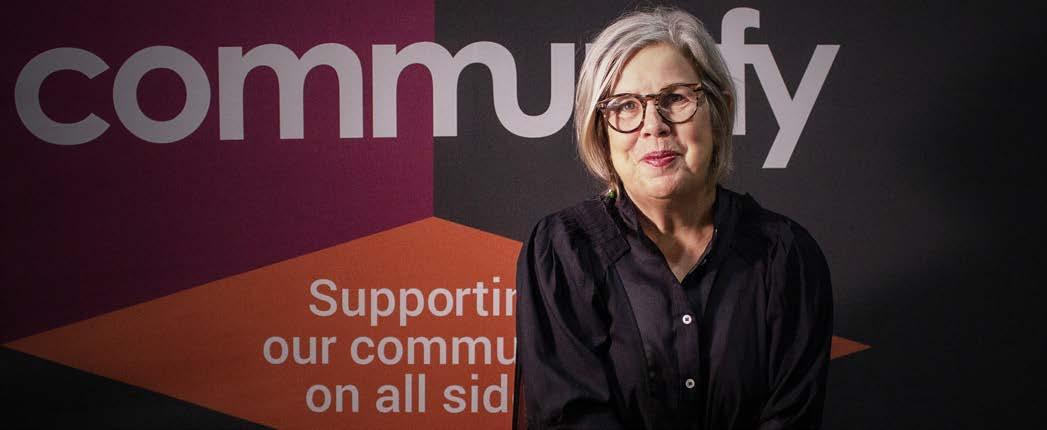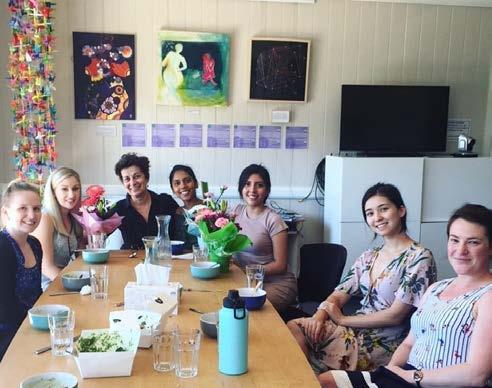
5 minute read
Client Clinical Services
Medicare Related Services
In July 2018, we trialed a new Medicare arm. Clients with a Mental Health Care Plan or similar can access Medicare-subsidised individual counselling with either Claire Day (Social Worker) or Rosie Davidson (Clinical Psychologist).
This trial was so successful that in February 2019, we introduced three permanent Medicare counsellors to our team. Clients with a Mental Health Care Plan or similar can access Medicaresubsidised individual counselling or dietetics sessions with either Jane Bowman (Mental Health Social Worker), Carolyn Uhlmann (Registered Psychologist), or Megan Bray (Dietitian).
The option of accessing subsidised individual counselling has helped to reduce the waiting times for our free counselling, and we plan to increase the availability of Medicare sessions in the future to ensure that all clients can access counselling in a timely fashion.
Similarly, the ability to see a dietitian on-site has proven to be popular, with Megan now opening her books for a full day each week.
In December 2018, a new Medicare eating disorder funding initiative was announced, set to introduce life-changing amendments to the Medicare Benefits Scheme to improve access and affordability of eating disorder treatments. The reform is set to feature a dedicated single Medicare Benefits Scheme item number for eating disorder treatment for those with severe and complex illness, delivering up to 60 Medicare funded sessions of treatment – 40 psychotherapeutic and 20 dietetic across the range of eating disorders – anorexia nervosa, bulimia nervosa, binge eating disorder and atypical presentations.
The scheme also relies on diagnosis by a GP and mental health practitioner, to recognise that these psychiatric illnesses have a significant physical impact and integrated treatment is essential. Eating Disorders Queensland welcomes this reform as a step in the right direction towards improving accessibility and availability of care for those living with an eating disorder and will be expanding our Medicare arm from November 2019 to accommodate the increased number of sessions available to each client.

Individual Counselling
Throughout 2018 and 2019 Eating Disorders Queensland (EDQ) has continued to provide quality therapeutic services to individuals. Clients have continued to access counselling services via our free counselling services as well as the Medicare counselling stream which has continued to grow and develop.
Our one-on-one counselling services are firmly grounded in evidence-based models and techniques which are client driven, respectful and work to empower the individual. We work in a holistic way; working closely with other professionals and support that make up an individual’s treatment team. Moreover, we work collaboratively with clients to grow and develop their support networks, including connecting them in with those with a lived experience of eating issues.
In line with our strive for continuous improvement and the delivery of high-quality services, all practitioners undertake regular clinical, peer and external supervision. Initial intake and waitlist processes have continued to be reviewed and updated to adapt to EDQ’s growth and client demand for therapeutic counselling services.
Throughout 2018 and 2019 EDQ has continued to grow the Medicare Arm; contracting practitioners to deliver evidence-based treatment under the Better Access Scheme.
The service has successfully increased access for individuals to affordable and quality counselling for eating issues, and reduced time individuals spend on the counselling wait list. The ongoing use of the Eating Disorder Examination Questionnaire (EDE-Q), Recovery Assessment Scale (RAS-DS) and the Depression Anxiety Stress Scale (DASS) with all individual counselling clients enables the collection and evaluation of rich data which continues to inform service delivery and continuous improvement.
EDQ acknowledges the valuable contributions made by students, volunteers and Medicarerebate counsellors to our counselling services, who are integral to service delivery and continuous improvement of service delivery.

Therapeutic Groups
Our long-running group therapy program is open to people of all genders from age 16 years. The popular therapeutic group aims to create a safe and supportive environment for people to explore some of the underlying reasons why we might be struggling with eating issues.
We look at a range of topics including feelings and needs, relationships and communication, body relationship and acceptance, mindfulness and how gender roles, cultural and family expectations might play a factor in eating issues.
The group explores these different topics through discussions and expressively based therapeutic activities which serve to explore the reasons underlying our eating disorder and build our support networks, skills and resources in our recovery journey.
The sense of community created in the groups and the story sharing by participants support people to counter the sense of shame, guilt and isolation that can come with having an eating issue.
During this financial year, a 10-week and a 12- week therapeutic group were run. Evaluation of the groups determined that while the extra time allowed opportunities for more activities and learning, it was not necessary for the growth of the clients within the group. Future groups will return to the 10-week program.
We have a wonderful range of mentors and speakers within our service and in these groups this year, we introduced the inclusion of two speakers to come into group towards the end to speak
about their experience of recovery. This also was an opportunity for group participants to ask these speakers questions that they had in relation to recovery, ideas and what was helpful and not helpful. The speakers stay and share in the group meal and this was also an extended opportunity for the group to hear more from these speakers. Group participants shared that they really loved this aspect of the group and found it motivating, inspiring and gave them hope that recovery was possible.
In our final week reflection the group shared that at the beginning they felt/experienced overwhelming feelings, uneasiness, feeling of uncertainty. By midway through the group were beginning to feel less isolated, more light within. Participants narrated that establishing connection within the group, listening to one another’s story and sharing their own story helped them grow and feel uplifted.
There was a sense of self-discovery, additionally participants began to learn new things and have different perspectives. Reflecting on being at the end of the group, people commented that they continued feeling positive and able to sit with their vulnerable feelings. Participants also mentioned that the group’s encouragement and warmth helped them to discover themselves.










